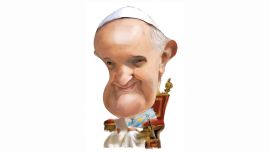Ever since its foundation exactly a century ago in Paris, the World Organisation for Animal Health (WOAH, or Organización Mundial de Sanidad Animal, OMSA in its Spanish acronym) has always had a French helm, an infrequent hegemony among international organisations which an Argentine veterinarian seeks to end.
"The countries are realising that a process of alternation has to begin, it’s now or when?" asksLuis Barcos, the Argentine candidate for the next director-general and the current head of the Americas region.
In 1924, 28 countries agreed to create the Office International des Epizooties (OIE, given its current designation in 2003), after a rinderpest crisis in Belgium due to zebus being transported from South Asia to Brazil via the port of Antwerp.
A century later 183 countries make up this association which seeks to improve animal health and provide information on veterinary diseases and which on May 28 will have to pick its next director-general "behind closed doors," indicated the OMSA.
France and Argentina are the only countries to present candidates to succeed Monique Éloit, who since 2016 has been the 7th French citizen to run this little-known organisation with its headquarters in Paris.
The delegates "will not be choosing between an Argentine man and a Frenchwoman," but on the basis of their "personality, dynamism, competence and skills," Emmanuelle Soubeyran, the head of the French veterinary services and the local candidate, assured AFP.
The Argentine vet is nevertheless presenting himself as the candidate of the "global South," assuring that he has the support of the Americas and Africa while his rival defines herself as the "candidate of the European Union" and urging a better regional representation in OMSA decision-making.
Global distribution
According to Richard Gowan, United Nations director for the NGO International Crisis Group, "it bothers many non-European diplomats that Western officials take these top posts for granted. There is a strong feeling that the selection processes for many international organisations are not meritocratic with Europeans clinging to world posts despite their loss of global influence," he assures AFP.
Europeans of different nationalities have been the managing directors of the Washington-based International Monetary Fund, while the statutes of the International Committee of the Red Cross, situated in Geneva, establish that its president be Swiss.
The World Bank and UNICEF, both with headquarters in the United States, have always been directed by citizens of that country.
And all that despite the United Nations, the paradigm of multilateralism, following a system of "regional rotation" when electing its secretary-general, which should also take into account "gender equality" since until now they have all been men.
Within this global distribution, in which China also seeks to play its part, Gowan highlights that "Argentina seems to be a non-European country which produces many international officials, even if we don’t count the Pope [Francis]," he jokes.
The secretary-general of the World Meteorological Organisation (WMO) and the director-general of the International Atomic Energy Agency (IAEA) are compatriots of the Pope.
Shared priorities
Both OMSA candidates defend a similar programme: to boost their positioning as a reference for animals within worldwide health governance together with other organisations such as the World Health Organisation, the FAO (Food and Agriculture Organisation) and the UNEP (United Nations Environment Programme).
A further priority is to reinforce the capacities of member countries to comply with the recommendations of this organisation, which also seeks to facilitate trade.
Last November, for example, they alerted that "almost 20 percent" of their members were still declaring the use of antimicrobials to promote the growth of farm animals, a practice which contributes to the development of a resistance to antibiotics.
But in order to try and differentiate themselves, each highlights their skills and curriculum vitae. Soubeyran underlines her technical knowledge, her managerial experience and her capacity to attract external financing, "something which will be very useful for the OMSA."
Barcos, who argues that he combines science and practice, started as a "rural vet" in the private sector before heading veterinary services in Argentina and is the current regional head of OMSA and now aspires to be the first person outside France to direct it worldwide.
related news
by Toni Cerdá, AFP




















Comments